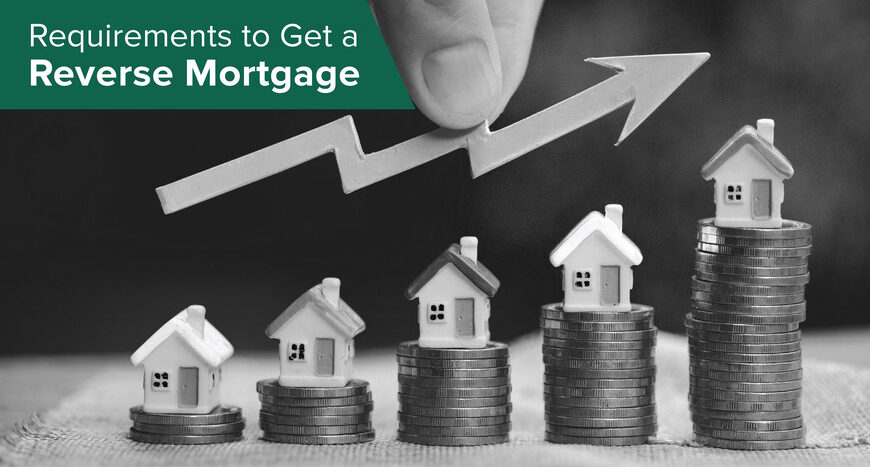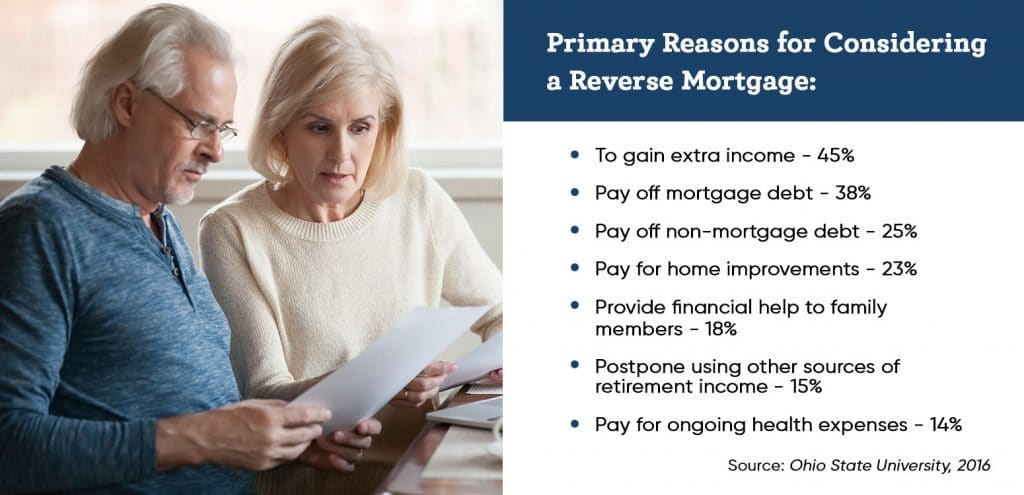A Guide to Help You Purchase Reverse Mortgage for Your Retirement Plan
A Guide to Help You Purchase Reverse Mortgage for Your Retirement Plan
Blog Article
Unlock Financial Flexibility: Your Guide to Acquiring a Reverse Home Loan
Comprehending the complexities of reverse home mortgages is essential for home owners aged 62 and older seeking monetary freedom. As you consider this choice, it is vital to understand not only just how it functions yet likewise the ramifications it may have on your financial future.
What Is a Reverse Home Mortgage?

The fundamental allure of a reverse mortgage hinges on its potential to enhance monetary adaptability throughout retired life. Homeowners can use the funds for numerous objectives, consisting of clinical expenses, home renovations, or daily living expenses, thus giving a safety and security net during a vital stage of life.
It is necessary to understand that while a reverse home mortgage enables boosted cash money circulation, it likewise lowers the equity in the home with time. As rate of interest builds up on the outstanding lending balance, it is important for possible customers to thoroughly consider their lasting monetary strategies. Consulting with an economic expert or a reverse home mortgage specialist can offer beneficial insights into whether this choice straightens with an individual's economic goals and conditions.
Eligibility Needs
Understanding the qualification needs for a reverse mortgage is important for house owners considering this financial alternative. To certify, candidates have to go to least 62 years old, as this age criterion allows seniors to gain access to home equity without regular monthly home loan settlements. Additionally, the property owner has to inhabit the house as their primary house, which can consist of single-family homes, certain condominiums, and made homes meeting particular standards.
Equity in the home is an additional necessary requirement; home owners usually need to have a significant quantity of equity, which can be determined through an appraisal. The quantity of equity readily available will directly affect the reverse mortgage quantity. Candidates must demonstrate the ability to preserve the home, consisting of covering property tax obligations, homeowners insurance coverage, and maintenance expenses, guaranteeing the residential property continues to be in good problem.
In addition, prospective customers should undergo an economic evaluation to examine their revenue, credit scores history, and overall monetary circumstance. This analysis aids loan providers identify the applicant's ability to meet ongoing responsibilities associated to the property. Fulfilling these needs is essential for safeguarding a reverse mortgage and making certain a smooth economic shift.
Benefits of Reverse Home Loans
Numerous benefits make reverse home loans an appealing option for senior citizens looking to enhance their economic flexibility. purchase reverse mortgage. Among the main advantages is the capability to convert home equity right into cash without the requirement for monthly home mortgage settlements. This attribute permits senior citizens to gain access to funds for different requirements, such as clinical expenses, home renovations, or daily living costs, thereby alleviating monetary anxiety
Furthermore, reverse home mortgages provide a safety and security net; senior citizens can remain to stay in their homes for as long as they fulfill the finance requirements, promoting security throughout retirement. The profits from a reverse home loan can also be used to postpone Social Safety benefits, possibly leading to greater payments later.
Additionally, reverse home loans are non-recourse financings, implying that customers will certainly never ever owe even more than the home's value at the time of sale, securing them and their successors from economic responsibility. The funds received from a reverse home loan are usually tax-free, adding one more layer of financial relief. Generally, these advantages placement reverse home mortgages as a sensible remedy for elders seeking to improve their economic situation while keeping their valued home atmosphere.

Fees and expenses Entailed
When considering a reverse mortgage, it's crucial to know the different prices and costs that can impact the overall monetary picture. Recognizing these expenditures is critical for making a notified decision regarding whether this financial product is ideal for you.
Among the main costs connected with a reverse home loan is the origination fee, which can differ by loan provider yet typically varies from 0.5% to 2% of the home's appraised worth. In addition, homeowners must prepare for closing costs, which may include title insurance coverage, assessment charges, and credit rating record costs, typically amounting to a number of thousand dollars.
One more considerable expenditure is home loan insurance costs (MIP), which protect the lending institution against losses. This cost is normally 2% of the home's worth at closing, with a continuous annual premium over here of 0.5% of the staying funding equilibrium.
Last but not least, it is very important to think about recurring prices, such as real estate tax, homeowner's insurance coverage, and maintenance, as the consumer remains in charge of these expenses. By meticulously examining these expenses and fees, house owners can much better assess the monetary ramifications of seeking a reverse home mortgage.
Steps to Get Started
Beginning with a reverse mortgage entails several essential steps that can aid simplify the procedure and guarantee you make notified choices. Evaluate your economic circumstance and establish if a reverse home mortgage straightens with your lasting goals. This includes examining your home equity, current financial obligations, and the requirement for added revenue.
Next, study different lenders and their offerings. Try to find trusted organizations with positive testimonials, clear charge structures, and affordable interest prices. It's vital to contrast problems and terms to discover the very best suitable for your requirements.
After selecting a loan provider, you'll need to complete a detailed application process, which typically needs documents of revenue, possessions, and property information. Participate in a counseling session with a HUD-approved counselor, who will certainly give understandings into the effects and obligations of a reverse home mortgage.
Final Thought
Finally, reverse mortgages provide a sensible alternative for senior citizens looking for to improve their monetary stability throughout retirement. By converting home equity into easily accessible funds, home owners aged 62 and older can attend to different financial demands without the pressure of regular monthly settlements. Understanding the complexities of qualification, benefits, and linked costs is necessary for making notified decisions. Mindful factor to consider and planning can result in better lifestyle, making sure that retirement years are both safe and fulfilling.
Comprehending the complexities of reverse home mortgages is directory vital for property owners aged 62 and older looking for economic liberty.A reverse home loan is an economic product created mostly for property owners aged 62 and older, enabling them to transform a part of their home equity into cash money - purchase reverse mortgage. Consulting with a financial advisor or a reverse home mortgage expert can offer beneficial insights into whether this choice aligns with an individual's economic goals and scenarios
Furthermore, reverse mortgages are non-recourse fundings, indicating that borrowers will never owe more than the home's worth at the time of useful reference sale, shielding them and their beneficiaries from financial obligation. In general, these benefits setting reverse mortgages as a practical service for seniors looking for to enhance their financial scenario while keeping their valued home atmosphere.
Report this page